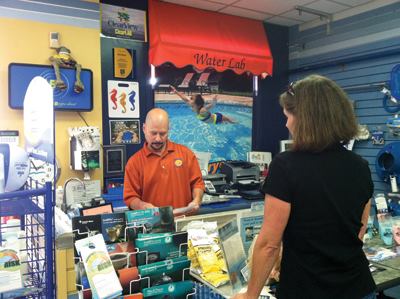Brick-and-mortar retailers are seeking a stronger voice within the pool and spa industry.
In recent months, a number of store operators have come forward to express a need for a national group that would empower retailers and encourage a healthy exchange of ideas and best practices.
“There are groups that cater to so many different parts of the industry, but retail really hasn’t been tended to,” said Barbara Hilburn-Pankratz, president/general manager of Nohl Ranch Pool Supply, based in Orange, Calif. “The more we share, the better we will be.”
This call to action was sparked, in part, by the mounting pressure that online retailing has placed on brick and mortars and the pricing concerns related to Internet sellers. Recently, a group of Arizona dealers began lobbying for stricter enforcement of minimum advertised pricing (MAP). Some think this is an example of what could be done if retailers had a national organization dedicated solely to their industry sector.
“Originally, my idea was for a smaller group in which independent retailers in like areas that face similar problems could exchange ideas, but you’d always hope it would eventually turn into a larger one,” Hilburn-Pankratz, said.
These sentiments are echoed across the country in Pennsylvania by Richard Giamusso, business manager of Olympic Pools’ three stores in the Scranton area. He said such a group would enable retailers to approach manufacturers with suggestions on how both sides can come to an understanding for the sake of their mutual survival.
“If you had 150 dealers to go to a manufacturer and say, ‘Listen, you better start thinking about us or you won’t have anyone around to do business with anymore,’ we might be able to control what’s going on with the Internet,” he explained. “You need to be heard, and you have to have a position of strength where you can make demands of manufacturers.”
While insiders agree this could lead to powerful and effective communication, some point to the Association of Pool & Spa Professionals and other groups as supporters of all branches of the industry, including retail. However, even Brian Quint, past chairman of APSP, said that while the association may be a good starting point, there possibly are legal issues, such as anti-trust, that could prevent it from hosting talks regarding pricing. Additionally, while he believes the idea of a national group is invaluable, he cautions against creating one and holding meetings without consulting legal counsel.
“If we could get around the constraints of anti-trust and price fixing, I think it’s a great idea,” said the president of Seattle-based Aqua Quip. “I think we have to engage manufacturers, distributors and the like in those conversations. We would need to go in with our eyes open and have good legal advice so we don’t get into a squeeze down the road.”
Establishing a national organization for retailers isn’t only about pricing and communicating concerns with manufacturers, however.
Hilburn-Pankratz said members would benefit from brainstorming new and effective approaches to marketing and other issues related to operating a brick-and-mortar store in an ever-evolving retail climate. It could even lead to a more formalized approach to spreading the word about the industry. If done properly, all members of the organization would partake, resulting in a universal message being passed down from stores to consumers about the importance of supporting pool and spa brick and mortars.
“I see the local pool supply like any other kind of service company such as a hairdresser or a mechanic, where people get to know and trust and come back to because they have a comfort zone,” Hilburn-Pankratz said. “It’s one thing to sell something and quite another to feel sincere about it. So if you could promote that somehow, it would be beneficial.”
Good intentions aside, there are clear logistical issues in creating a national organization, Giamusso said. First, a few individuals would need to step forward to assume some sort of leadership roles. Second, it would be a challenge to organize members from all over the nation. Not to mention, there are obvious differences in which companies operate in areas where climates and seasons range in temperature and length and how businesses meet the varying needs of their customers.
Perhaps of greatest concern to Giamusso is the competition he still experiences from similar nearby stores. Unlike Hilburn-Pankratz who has a healthy, positive relationship with retailers in her territory, Giamusso said competitors in his area view each other as enemies.
“Mostly, everybody is cutthroat,” he said. “It’s a shame because we are all in the same position.”
To meet some of these challenges, Hilburn-Pankratz suggests following in the footsteps of other industry organizations to set guidelines and parameters on how to properly share without encroaching on another’s territory.
In the meantime, creating an online forum using a popular social media platform such as Twitter or Facebook to see if there is enough demand would be an ideal place to start, she said. Of course, the idea is in the early stages and no formal leadership is even close to being established, she added.
“It’s something that would take time, but if you start small and throw out some ideas, maybe something will stick,” Giamusso added.


